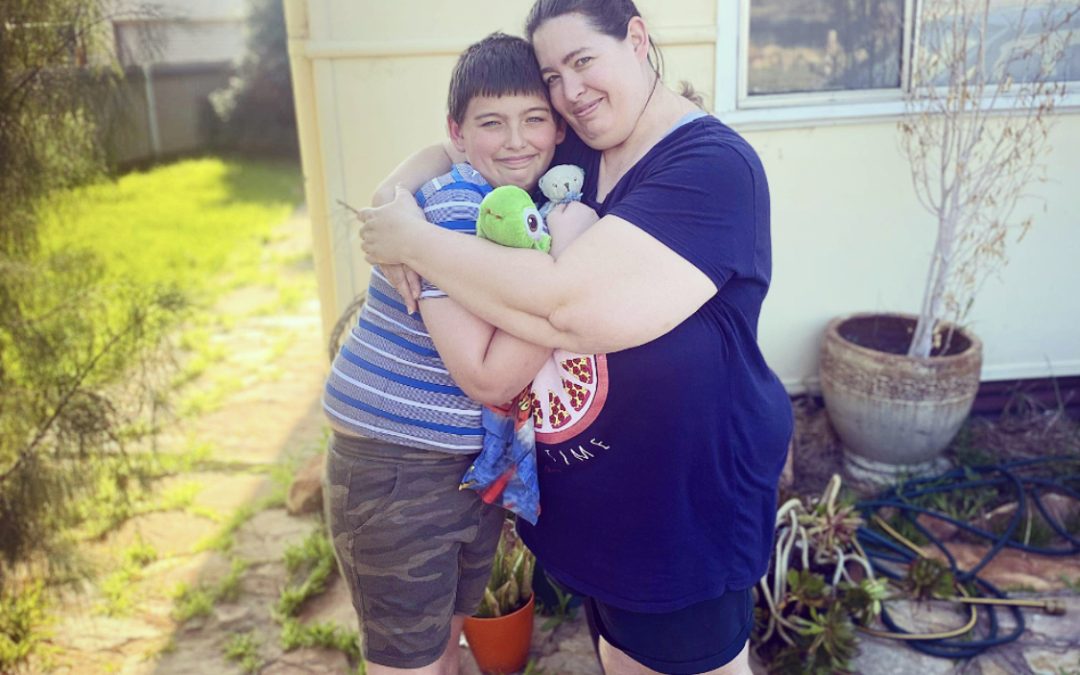‘It takes a village to raise a child’ is more than just a wise saying for single Mum Khrystal Davies – it’s a testament to the friendliness of a country community always willing to help both parent and child. The quietness and cleanliness of Northam are aspects that she loves about her home, remarking that people seem a lot friendlier in the regions because lots of people know each other.
Connection and a supportive community are important for everyone in the regions, but they have been paramount in the lives of Khrystal and her 12-year-old son, Owen. Khrystal lives with MS (Multiple Sclerosis) and the symptoms mean that she is unable to work, but that doesn’t stop her from volunteering and fostering even more connections within her community. With the migraines, mobility issues, and fatigue part of her daily life, she volunteers at her church whenever she can, mostly involved with kids and young adult ministry groups. Once a term she assists with the Ladies Coffee Night, which is an outreach social night for all women in the area to have fun, eat, and chat, maybe even meet some new friends.
Her mentor and friend Sheryl has been a wonderful support, driving her to medical appointments in Perth and doing crafts with her. Through her newly granted access to NDIS, Khrystal hopes that Sheryl can become her official Support Worker. The scheme also means that Khrystal now has access to Physio and Occupational Therapy, help with managing medications, meal preparations, cleaning and gardening, and Social Support – all of which she had been managing on her own for years.
Khrystal used to have her 6-monthly infusion for MS management at the Northam Regional Hospital and highlights how more people with MS can now receive similar treatment in Northam, which saves them from a very fatiguing and expensive trip to the city. Having treatments closer to home make all the difference, and Khrystal is even happier now because she is able to self-administer injections at home with a different medication.
Not only is she able to access services closer to community, but so is her son. Owen is on the autism spectrum and has been on the NDIS for 5 years, but because there are fewer services in the regions, it has been a real struggle for Khrystal. Owen’s appointments were in Perth, which was a 1.5 hour drive each way, but fortunately some of his services have become NDIA registered in the region, which saves a lot of driving.
Khrystal notes that things are better now that she has her diagnosis as she can access the MS Peer Support Group for men and women, which is good for her mental health. She’s received lots of advice regarding MS from their personal stories and experiences, and the fact that the group is so supportive and friendly is fantastic. Her diagnosis also made her notice difficulties with disability access including parking spaces, kerbs, paths, and accessible toilets. Along with the rest of the Group, she has spoken to the Shire Disability & Inclusion Officer to have these issues addressed for the community.
Khrystal has realised that some people have disabilities that are invisible as MS often is. Therefore, most people don’t even notice or understand that people in their communities have access needs that aren’t being addressed. She finds it important to be able to educate people on these topics, even if sometimes it feels like she is always explaining MS as well as autism to people, which can be exasperating.
Along her journey and by sharing her story, it seems like Khrystal has become a leader in her community, urging the Shire to ensure their community is accessible to all abilities, paving the way for people to receive treatment in community, and challenging others to broaden their perspectives and learn from each other.
Khrystal would love to get back to work in some capacity once her symptoms are manageable. Until then, she does her best to remain an active member of her community and a loving mother to her son Owen, who seems to have learned from her example as he is a very caring boy who looks after his Mum. He makes sure she drinks enough water and takes her medication – his empathy and consideration another challenge to the preconceived ideas that people may have about disabilities if they don’t take the time to listen and learn from the stories of others.
Story written by: Lynn Whyatt RRR Network Storyteller.

